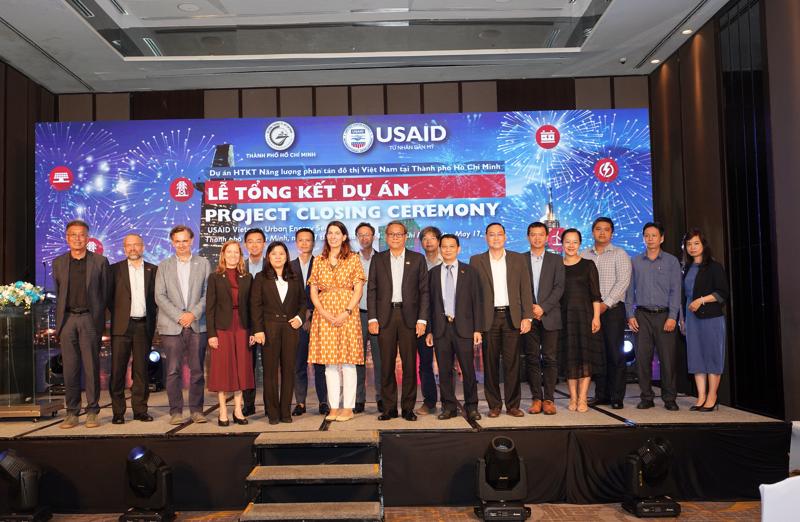The United States Mission to Vietnam, through the U.S. Agency for International Development (USAID), and the Ho Chi Minh City Department of Industry and Trade (DOIT), celebrated their joint success in a five-year partnership advancing renewable energy and energy efficiency in Ho Chi Minh City on May 17.
With more than $11 million in funding for Vietnam Urban Energy Security project, the United States Mission to Vietnam, through USAID, and Ho Chi Minh City's DOIT partnered to facilitate energy efficiency gains and develop and deploy new sources of renewable energy.
This is a joint success in a five-year partnership between USAID and Ho Chi Minh City's DOIT for advancing renewable energy and energy efficiency in the city.
As a result, the project has developed the city’s Net Zero Emission Strategy and its implementation roadmap, accompanied by a strategy to expand clean and new energy sources. These strategies will be vital for guiding the city’s renewable energy and energy efficiency efforts in the years to come.
The project also organized the first-ever Energy Efficiency Award program in Ho Chi Minh City to recognize high energy-consuming enterprises for their energy efficiency performance and achievements.
It has also mobilized $4.2 million in investment capital for clean energy developers and start-ups to implement projects on green hydrogen, battery energy storage systems, electric motorbikes, and electric transportation systems.
Under the Vietnam Urban Energy Security project, more than 500 staff of key financial institutions have been trained on advanced financial instruments like green bonds and clean energy investments to facilitate lending for clean energy projects; while nearly 200 government officials, energy managers, and technical managers also participated in training programs to promote adoption of energy efficiency policies and measures.
An Innovation Challenge Fund was established, funding seven innovative solutions to address urban energy and environmental issues in the city, enabling innovators to bring their cutting-edge ideas to life. These solutions include a Smart Air Compressor Control System, a Battery Energy Storage System, a Smart EVN Software Solution application, an Electric Motorbike Charging Service Solution, High-Efficiency Ceiling Fans, High-Pressure Condensate Recovery Solutions for Boilers, and a Smart Water Supply System Solution for Industrial Production Facilities.
“Our partnership with Ho Chi Minh City through USAID’s Vietnam Urban Energy Security project has helped to advance the city’s clean energy transition,” Ms. Aler Grubbs, USAID Mission Director for Vietnam, said, adding that “We applaud Ho Chi Minh City for its visionary clean energy plans, which serve as a model for how cities across Vietnam can improve energy security, increase environmental resilience, and advance net-zero emissions goals.”
The United States is a committed partner of Vietnam in advancing the country’s transition to a clean, secure, and market-based energy sector, in line with our two countries’ shared priorities under the Comprehensive Strategic Partnership, she said.
The USAID work in environment and climate change in Vietnam focuses on improving environmental security. This includes mitigating greenhouse gas emissions, building resilience to the impacts of climate change, conserving biodiversity, reducing pollution, and strengthening disaster preparedness and response. To advance these efforts, USAID partners with Vietnam to transition to clean energy, strengthen protected area management, expand sustainable forest management, counter wildlife trafficking, and engage with local communities on environmental pollution issues, such as air pollution, waste management, and water conservation.









 Google translate
Google translate